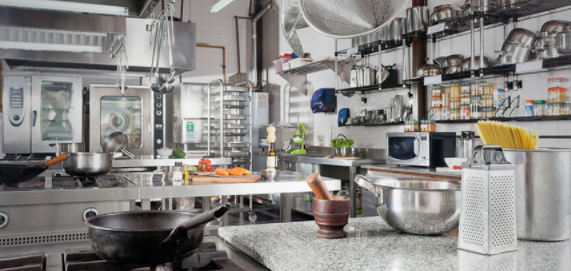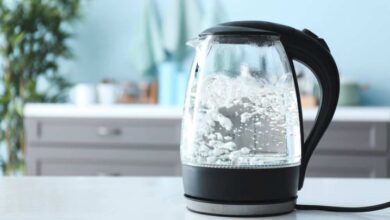Choose the Right Flooring for Your Commercial Kitchen

Throughout the day, commercial kitchen floors are subjected to high temperatures, continual streams of water, and heavy industrial cooking equipment. After that, things get even worse. For commercial kitchen flooring, you’ll need a material that can satisfy several criteria, including the ones listed below:
- Durability: Increased traction and reduced chance of tripping or falling on an anti-slip surface
Regular use of harsh cleaning chemicals will not damage this easy-to-clean floor. - Bacterial growth and infection can be prevented by pre-treating a material.
- An area where workers can stand for lengthy periods of time without discomfort.
- This means that anything that enhances your design strategy and creates a good mood while also promoting your brand is preferred in terms of aesthetics.
Is it possible to find materials that meet all of these specifications? Both ceramic tiles and vinyl floors are popular options for commercial kitchen floors. The use of natural stone tile and brick in restaurants and hotels is limited to specialized contexts.
CERAMIC FLOORING
After shaping the clay into tiles and baking them in an oven, ceramic tiles are ready to be used. Ceramics are also available in the form of porcelain and non-porcelain composites. Durable and low-maintenance, ceramic requires little to no upkeep and is easy to clean. In commercial kitchens, ceramic is coated with a molten glass glaze that protects the surface from wear and tear, stains, and moisture. Porous unglazed ceramic will not be able to withstand the rigors of a professional kitchen.. The glaze, which may be made in any design, including wood grain and other natural patterns, allows ceramic to take on a wide range of appearances. You can replace a broken tile one at a time without shutting down the kitchen.
Examples of specialty materials include natural stone tile and brick.
The most frequently used specialized materials in commercial kitchens are natural stone tile and brick, both of which are formed of natural stone. Ceramic and vinyl flooring, while more expensive than ceramic and vinyl, are used in some cafes, delis, and restaurants where the kitchen is visible to the public and acts as an important part of the entire atmosphere and brand. It’s possible to get both a sophisticated look and a warm and welcome feel with stone and brick. Redbrick colors may even entice diners to eat at a restaurant. It is made from components that have been extracted from the earth’s surface. Read more about AC Installation.
For a commercial kitchen, some stones are better suited than others. Natural stone tiles with glossy surfaces should be avoided since they become dangerously slick when wet. Denser stones, such as slate and granite, are more stain-resistant and easier to clean than those that have been sanded or buffed. Porous all-natural stone tiles necessitate the regular application of protective equipment. There are multiple daily items of washing required to keep them in top condition. Brick is susceptible to water damage, despite its resilience, due to its porous nature. Once or twice a year, professional sealers, which can tolerate stains and other potential threats, should be used. Many brick owners also coat their bricks in a variety of waxes. Regular scraping and reapplication of wax, on the other hand, is required in order to keep the wax from collecting.
INSTALLATION AND MATERIAL FACTORS TO BE CONSIDERED
Installation of commercial kitchen flooring is equally as important as selecting materials, and the process does not end there. This part focuses on a few of the best ideas gleaned from an experienced workforce.
- As a flooring contractor, you can purchase the most cost-effective items and negotiate better prices with manufacturers through them rather than directly from the manufacturers themselves.
- Your flooring installer should be able to tell you whether your concrete slab has any moisture issues. Your warranty may be void if you don’t get rid of the wetness on your floor.
- A proper installation is essential. To guarantee that the tiles do not crack or break, your flooring installer must use the right, manufacturer-recommended sub-base and underlayment materials. The tiles will break and split if there is an air bubble underneath them.
- There are certain types of floors that require particular installation methods to assure a correct fit and to meet the guarantee. In some cases, highly-trained teams are available to install specialized flooring on a construction site.
- You should work with your installer to keep extra tiles on hand and prepare for replacements and maintenance — most products come with some instructions for replacement and maintenance, which you should adhere to.


